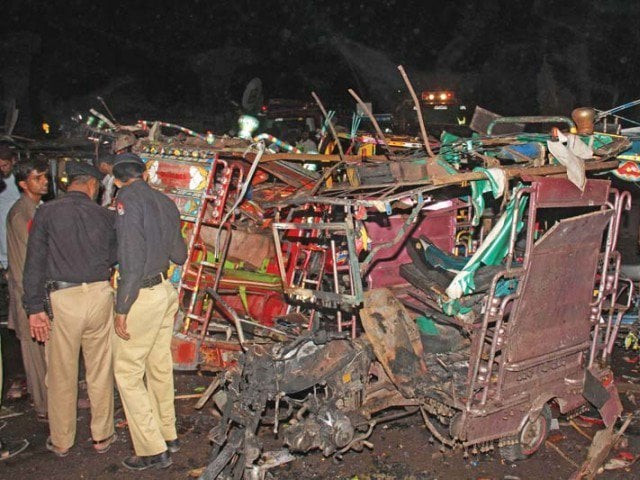Blast in Multan
Despite a large-scale military operation, terrorist forces are able to carry explosive material through large cities

Policemen inspect the site of an IED explosion in Multan. PHOTO: EXPRESS
A total of 11 persons were killed in the incident, more than 80 injured and 52 shops damaged or destroyed. The suspicion is that while Vehari Chowk is a busy area of the city, with many coach stands, bus stands and shops, the target may have been a different location. The possibility of an attempted suicide bombing is not being ruled out. Ball bearings have been found at the spot and a crater left behind. It is not insignificant that the incident took place in southern Punjab, an area which is known to have a heavy presence of extremist groups. In recent weeks, a campaign has been under way against them as well as against seminaries operating in the area. It is also worth noting that despite the large-scale military operation being carried out in the country, terrorist forces are still able to operate and carry explosive material through large cities. Our policies to defeat them have recently come under review at high-level meetings. The military has demanded greater action by civilian authorities. Certainly, we need to know more about the methods used by various groups. An in-depth inquiry into the Multan incident could help take us further in achieving this and uncovering more vital information.
This information must then be put together and used as a means to stop terrorists in their tracks before they can inflict further havoc. Military force alone can never be enough. We also need good intelligence and assistance from communities and individuals, who can help identify the locations where terrorists are based and the manner in which they carry out their activities.
Published in The Express Tribune, September 15th, 2015.
Like Opinion & Editorial on Facebook, follow @ETOpEd on Twitter to receive all updates on all our daily pieces.














COMMENTS
Comments are moderated and generally will be posted if they are on-topic and not abusive.
For more information, please see our Comments FAQ